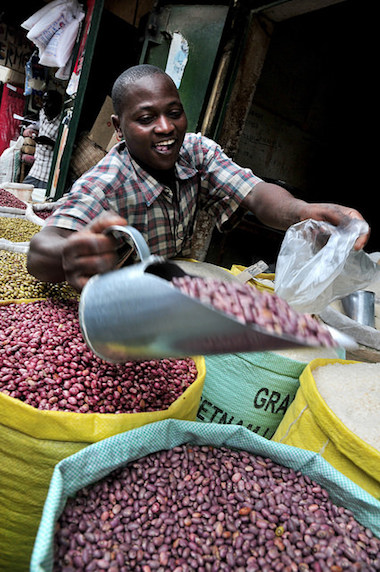On June 15-16, 2016, the European Commission (EC) will host the 10th European Development Days (EDD) to bring the development community together to share ideas and experiences in ways that will inspire innovative solutions and new partnerships that address the world’s most pressing challenges. To engage the development community in accelerating progress towards food and nutrition security, IFPRI, Concern Worldwide, the Technical Centre for Agricultural and Rural Cooperation (CTA), and Welthungerhilfe are organizing a session during the EDD on “Ending Hunger and Undernutrition: It can be done faster.” Preceding the EDD, IFPRI together with the EC and other partners, will hold an event on June 14 on “Going the Last Mile: Accelerating Progress in Food Security and Nutrition.”
IFPRI and the EC have been partnering for many years to ensure food and nutrition security. Their collaboration includes the creation of the Food Security Portal (FSP) in 2009—a centralized open-access food security information website that offers comprehensive, real-time data, news, and research on food security at the country, regional, and international levels—in partnership with the Swiss Agency for Development and Cooperation. By giving policymakers and stakeholders access to relevant information, the FSP is helping revolutionize food and nutrition security policymaking to be more evidence-based. The successes of the FSP encouraged the launch of region- and country-specific portals in 2015: Central America and the Caribbean, India, and Sub-Saharan Africa.
IFPRI and the EC are also tackling emerging topics that impact food and nutrition security. When biofuels gained popularity in the 2000s, at the EC’s request, IFPRI conducted a thorough evaluation of the European Union’s (EU) biofuel policies in 2009. Study results influenced the EU Parliament to amend the Renewable Energy Directive and related legislation in 2015, which limits the EU member states’ consumption of biofuels grown from local or foreign agricultural land to 7 percent of their total biofuel consumption. IFPRI estimated that this amendment would reduce CO2 emissions by 13 million tons due to land-use changes in developing countries, save 800,000 hectares of cropland, and produce enough food to feed 70 million adult males annually at the global level.
IFPRI and the EC also work together to improve nutrition security by increasing the transparency and accountability of countries’ progress in achieving the World Health Assembly (WHA) Goals for 2025. In 2014, IFPRI, the EC, and other partners including the CGIAR Research Program Agriculture for Nutrition and Health (A4NH), launched the Global Nutrition Report—a first-of-its-kind succinct review of global nutrition that highlights countries’ progress in combating malnutrition. In the short time since its launch, the Global Nutrition Report has encouraged renewed commitments and promoted a culture of accountability that is crucial in improving nutrition worldwide.
EC’s support to IFPRI and A4NH has been instrumental to the success of HarvestPlus, particularly in the development and distribution of zinc rice in Bangladesh. By the end of 2015, HarvestPlus and its partners provided 160,000 households with new zinc rice varieties, which deliver 60 percent of the daily zinc needs and are disease and pest resistant.
For more information on the partnership between IFPRI and the EC, please see this brochure. And to see more outcome stories, go to the Outcome Stories Website.







